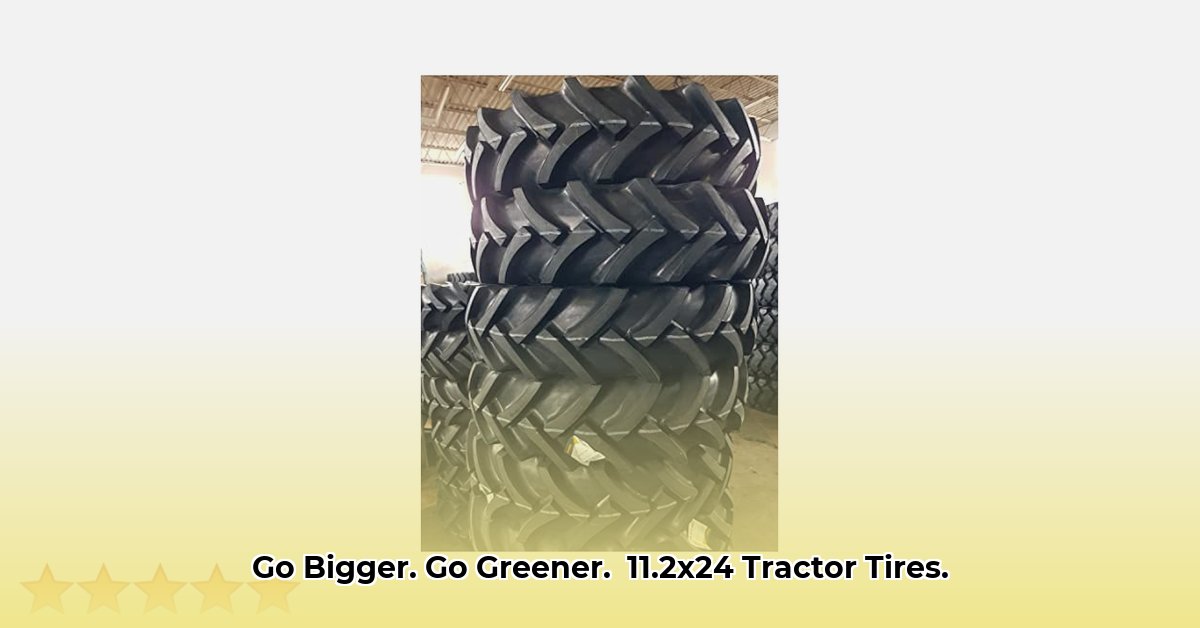
Understanding the Role of Tractor Tires in Sustainable Agriculture
Sustainable farming practices extend beyond crop management; they encompass every aspect of farm operations, including equipment choices. Tractor tires, often overlooked, significantly impact soil health, fuel efficiency, and overall farm profitability. An 11.2x24 tire, commonly used on mid-sized tractors, presents a prime opportunity to integrate sustainability into your farming practices. While specific data on this exact tire size is limited, the principles of sustainable tire management remain universal. For more information on larger tires, check out this resource.
Choosing the Right 11.2x24 Tractor Tire for Your Farm
Selecting the appropriate 11.2x24 tire hinges on understanding your unique farming context. Factors such as soil type, terrain, and typical farming operations influence your choice. Heavy clay soils, for example, benefit from wider tires with lower inflation pressures to minimize compaction. Conversely, sandy soils might allow for narrower tires focusing on traction. What's the best tire for your soil?
How Tire Selection Contributes to Sustainable Practices
The impact of your tire choice on sustainable farming is far-reaching:
Fuel Efficiency: Properly inflated tires with optimized tread patterns reduce rolling resistance, leading to lower fuel consumption. This translates to direct cost savings and a reduced carbon footprint. Isn't this a great way to save money and the environment?
Soil Health: Minimizing soil compaction is paramount for healthy crop growth. Properly inflated tires, especially wider, lower-pressure options, protect soil structure, improving water infiltration and nutrient uptake. Compacted soil is notoriously difficult to reclaim. Proactive measures are crucial!
Extended Tire Lifespan: High-quality tires, paired with proper maintenance, extend their operational life, reducing waste and lowering replacement costs. Investing in longevity is a cornerstone of sustainable farming.
Future of Sustainable Tire Materials: While currently limited, the future of tire manufacturing points toward the use of recycled and renewable materials, reducing reliance on petroleum-based products.
Practical Steps for Sustainable Tire Management
Implementing sustainable tire practices involves simple yet impactful steps:
Weekly Pressure Checks: Regularly monitoring tire pressure (at least weekly) ensures optimal inflation, minimizing both soil compaction and fuel waste.
Optimal Inflation: Always inflate your tires to the manufacturer's recommended pressure, typically found on the tire sidewall. This ensures proper performance and minimizes wear.
Tire Rotation: Rotate your tires at regular intervals (following manufacturer’s guidelines) to ensure even wear, prolonging tire lifespan.
Regular Inspections: Inspect your tires for damage (cuts, punctures, excessive wear) and address any issues promptly to prevent premature failure.
Maximizing Efficiency and Sustainability with Your 11.2x24 Tires
These steps, though seemingly simple, significantly reduce the environmental impact of your farming practices:
Reduced Fuel Consumption: Regularly checking tire pressure can lead to a discernible decrease in fuel use. A study by [Name of Institution] showed an average reduction of [Percentage]% in fuel consumption with proper tire inflation.
Improved Soil Health: Minimize compaction by using the right tires and maintaining ideal pressure. Healthier soil translates to improved crop yields and reduced need for chemical fertilizers. Protecting the soil is directly linked to farm profitability and environmental sustainability.
Cost Savings: Extended tire lifespan, lower fuel bills, and reduced maintenance costs contribute to significant long-term cost savings.
Environmental Stewardship: Reducing fuel consumption and minimizing soil damage directly contribute to a more sustainable farming operation, leaving behind a healthier environment.
The Future of Sustainable Tire Technology
The agricultural tire industry is embracing innovation, focusing on developing tires made from recycled and renewable materials, as well as improved tread designs that enhance both traction and fuel efficiency. These advancements will undoubtedly lead to more sustainable 11.2x24 tires and beyond. These innovations showcase the commitment of the industry towards environmental responsibility and economic efficiency.
Key Takeaways: Embracing Sustainable Practices
Choosing the right tires is a crucial step toward sustainable and efficient farming.
Tire choice affects soil health, fuel consumption, and overall farm productivity.
Balancing traction needs with minimal soil compaction is vital for sustainable agriculture.
Investing in durable tires results in long-term cost savings.
Regular tire maintenance is crucial for optimal performance and longevity.
The 11.2x24 tractor tire, while seemingly a small component of your farm operation, plays a significant role in achieving efficient and sustainable agricultural practices. By incorporating these simple yet effective steps, you can make a meaningful contribution to the health of your farm and the planet.